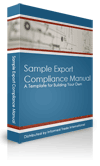Avoiding Deemed Export
That’s not an Export…That’s my laptop!!! Avoiding the curse of the “Deemed Export”.
One of the issues that seems to create great confusion and problems among those exporters of ITAR related products & information is the principle of “Deemed Exports”. With little effort, an unsuspecting USA manufacturer and/or exporter can find him/herself in trouble with the US State Department due to an export of ITAR related information of which they were not aware and did not intend.
As in all ITAR situations, one must always know with whom you are sharing ITAR related information and only share ITAR related information with individuals or corporate entities that can prove they are authorized to receive ITAR related information by verifying their ITAR registration with the US State Department.
First, as we all know, a basic export is the transfer or shipment of a good, technology or information from the customs territory of one country into the customs territory of another country. This definition recognizes the essential act of physically and with purpose sending goods, technology or information across national boundaries.
What then is meant by the term “deemed export”? A “deemed export” involves either the intentional or unintentional transfer of information across national boundaries, except the act of crossing those national boundaries can occur within the territory of the US or in cyber space. In other words, Non US citizens (Foreign Nationals) gaining access to ITAR related information within the US constitutes a “deemed export” of that information even though they are physically domiciled within the US. Under current ITAR regulations, when the Non US citizen (Foreign National) gained access to your ITAR information, you unintentionally exported that information just as if you sent that person your ITAR information in their native country. Thus the US State Department has “deemed” you exported that information. The “deemed export” definition also applies to your very own Non US Citizen (Foreign National) employees.
Another area of great concern for “deemed exports” is in the use of the worldwide web/email/ cyber space. The act of sending and receiving emails, files, PDF’s, etc. from your laptop or any other computer while outside of the territory of the US or sharing said information with a non US citizen (Foreign National) in or outside the US is also “deemed” an export of that information for State Department regulatory purposes. Additionally, the simple act of carrying your laptop outside of the territory of the US with any ITAR related files on the hard drive and/or on any exterior data storage devices is also considered a “deemed export” of that information. Finally the act, by you, to access any ITAR related files from your US domiciled company data base/files or receive any ITAR related electronic information while outside of the territory of the US is also considered a “deemed export” of that information.
To avoid any “deemed export” issues,related to your non US citizen (Foreign National) employees, it is suggested that you or your HR/Employment group/department research the background of all of your non US citizen (Foreign National) employees and determine if they will be in a position to obtain ITAR restricted information in the course of their daily employment. If no, document your workflows and ITAR processes to verify your conclusion and proceed as normal. If yes, then you may be put into a position to either decline ITAR related projects or apply to the US State Department for an individual ITAR export license for each of your non US citizen (Foreign National) employees.
When conducting business within the worldwide web/cyberspace, plan ahead, Do not send ITAR related information/files/PDF’s, etc. through the worldwide web without knowing, for certain, the recipient has the proper authorization to receive ITAR information. Always know what ITAR information is on your laptop hard drive and/or exterior data storage devices before departing the US and If possible, remove all ITAR information. While out of the country, do not access emails or files pertaining to ITAR projects. One possible solution is have all ITAR related files sent directly to a restricted company controlled ITAR web address, not directly to your company email address. Files noted as ITAR and sent directly to your email should be re-sent to another company restricted ITAR file and deleted without opening, Files not noted as ITAR and opened inadvertently but containing ITAR related information should also be sent directly to another company restricted ITAR file and immediately deleted. NEVER make hard copies or send/forward ITAR related information to any other non authorized ITAR recipients.
If the reason for your trip is to conduct ITAR related business with a Foreign National/Corporate Entity, then verify your hosts are authorized to receive ITAR related information and contact the US State Department to gain permission- license/Manufacturers Agreement to transport said ITAR information.
Planning ahead and understanding the principle of “deemed export” will assist you and your company in maintaining full ITAR compliance and avoiding any unnecessary ITAR audit issues.
Submitted by: Bernard Van Ham
Posted on March 17th, 2008 by keeton
Filed under: ITAR

